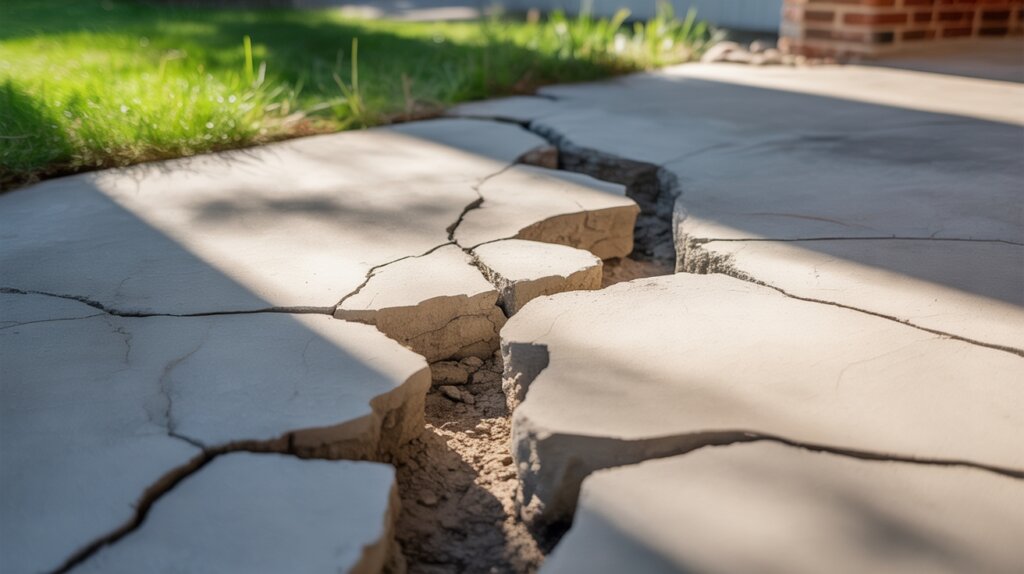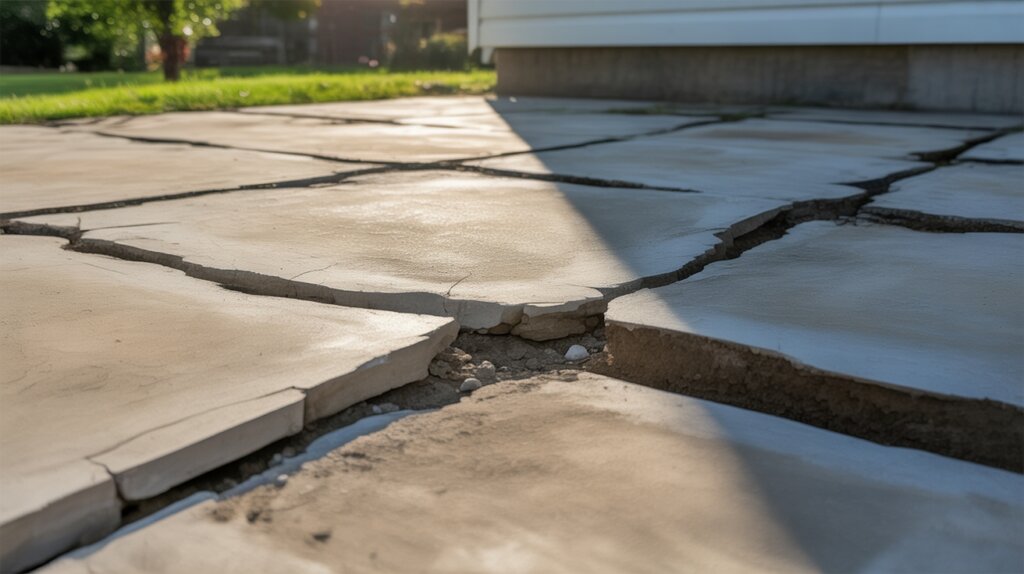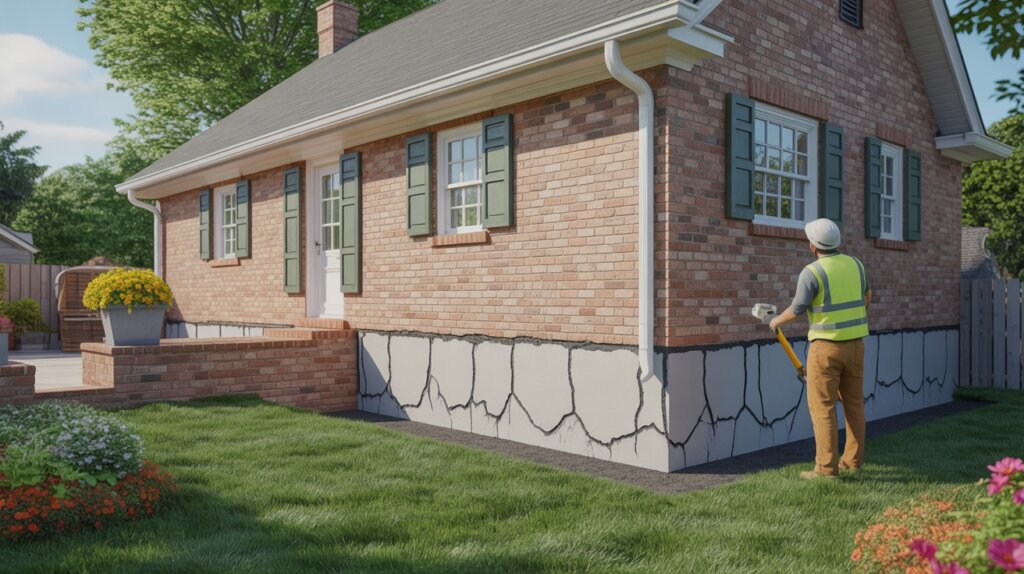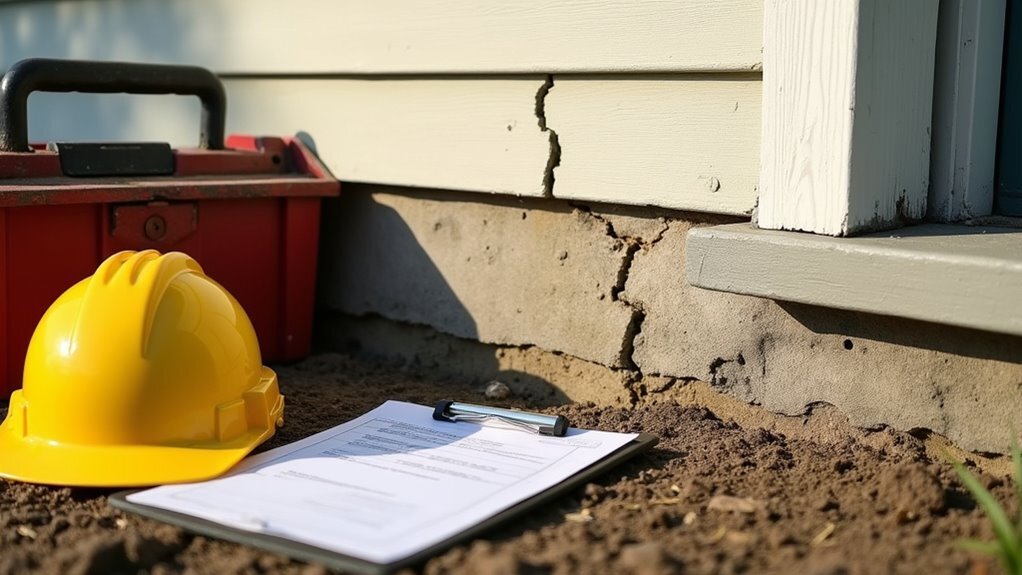Selling a home with foundation issues can be a tough choice. Many homeowners worry about how these problems affect their sale. You may wonder if repairing the foundation before listing is the right move.
Foundation problems can scare off buyers or lead to low offers. Some buyers see these repairs as risky or expensive. The result could be a home that sits on the market for months.
In most cases, repairing foundation issues before selling is the smartest decision. This step can attract more buyers and increase your selling price.
It also builds trust and speeds up the sale. This blog will guide you through the decision and help you make the best choice for your situation.
Key Takeaways
- Repairing foundation issues before selling can increase your home’s value and attract more potential buyers.
- Unrepaired foundation problems may result in lower offers or difficulty securing buyer financing and insurance.
- Fixing foundation issues typically leads to smoother negotiations and fewer surprises during inspection.
- Disclosing repairs with transferable warranties builds trust and increases buyer confidence in your property.
- If you sell as-is, expect reduced buyer interest and potentially significant price reductions to compensate for repair costs.
Understanding Common Foundation Problems

Foundation problems are common and can cause serious damage to a house. Most problems are settling, cracking, or shifting of the foundation. If you spot these issues early, you can fix them before selling your home.
Poor soil or bad drainage around your house causes most foundation issues. The soil under your home may move if it gets too wet or too dry. This movement can weaken your foundation and cause visible damage. Recognizing signs like mud tubes or hollow-sounding wood is important for early detection. Addressing foundation repairs promptly can also help you unlock home equity and improve marketability.
You can fix these problems by using techniques like piers or underpinning. If you repair the foundation and keep records, buyers will feel more confident. Proper repairs can make your house stand out in a tough market.
Signs Your Home Might Have Foundation Issues
You’ll want to watch for visible wall cracks and uneven floors, as these are often the first signs of foundation issues. Buyers notice these problems right away, which can impact your home’s value and marketability. Addressing them early protects your investment and keeps your sale on track.
Additionally, understanding proper pricing strategies can help you avoid overpricing your home and prolonging the selling process. Ensuring the title is clear and free of liens or encumbrances before listing can also prevent complications during closing and streamline the sale.
Visible Wall Cracks
Visible wall cracks are signs of possible foundation problems. Cracks that are wide, jagged, or new need quick attention. These cracks can affect your home’s value.
Buyers and inspectors notice wall cracks right away. If you ignore them, selling your home may become harder. Wall cracks can lead to tough negotiations.
A professional foundation inspection is a smart next step. If you fix these issues early, buyers will trust your property more. Early repairs can help you avoid delays and get better offers.
Uneven Floors Detected
Uneven floors in your home often mean there are foundation problems. These floors can hurt your home’s value and make selling harder. Fixing them before listing your home is important.
A professional foundation inspection can find the cause of uneven floors. If floors tilt, sag, or bounce, buyers may worry about bigger issues. Other signs include gaps at the base of walls and doors that do not stay shut.
Furniture that never sits level can show the same problem. Addressing these signs early helps you control repairs. If you fix the issues first, buyers may feel more confident about your home.
How Foundation Problems Impact Home Value

Foundation problems can lower your home’s value. Cracks or uneven floors make buyers and appraisers cautious. A damaged foundation can reduce your home’s price by 10% to 20%. To effectively address these issues, it’s important to understand the extent of the foundation issues through a thorough inspection. If you notice any issues, schedule a professional inspection.
An expert can explain what repairs are needed. This will help you prepare for questions from buyers. If repairs are expensive, consider financing options. Many lenders and contractors offer payment plans for sellers. Fixing foundation problems before selling helps you attract more buyers and get a better price. Additionally, obtaining title insurance can protect you from potential legal defects or undisclosed liens that might arise during the sale process.
What Buyers Think About Foundation Damage
Buyers often see foundation damage as a big problem. They worry about safety, repair costs, and future issues. Most buyers look closely at homes with these problems.
Many buyers will ask for a detailed foundation inspection. They may talk to a repair expert before making any offer. Some buyers might not want to move forward at all.
If the foundation is not fixed, buyers may offer less money. Some buyers could walk away from the deal. Sellers should be honest and share information early.
Clear communication helps build trust. If sellers explain the damage and repairs, buyers may feel more comfortable. This can lead to better selling results. Additionally, understanding liens and legal issues involved in the property can further influence buyer confidence and the overall sale process. Recognizing how timing and pricing strategies impact the sale can also make a difference in negotiations and final offers.
The Cost of Foundation Repairs

You’ll find that foundation repair costs can range widely, often falling between $2,000 and $10,000 depending on your home’s specific needs. Factors like the extent of the damage, foundation type, and local labor rates all play a role in determining your final bill. Understanding these variables helps you budget wisely and negotiate confidently with buyers.
Additionally, researching local market trends can help you decide whether investing in repairs will increase your home’s value enough to justify the expense. Proper documentation and legal compliance are essential if you plan to disclose or repair foundation issues during the sale process, especially in probate situations where transparency is critical.
Typical Repair Price Range
Foundation repair costs range from $2,000 to $7,000 for most homes. Prices depend on the foundation type and the repair method. If the problem is complex, costs may be higher.
Minor crack repairs usually cost $500 to $1,500. If the repair involves piering or underpinning, expect to pay $2,500 to $10,000. Major structural repairs can cost from $10,000 to $30,000 or more.
Slab jacking or mudjacking repairs cost $500 to $4,000. If you get a professional assessment, you can choose the right repair for your situation. Knowing these costs helps you plan your budget and decide on repairs before selling.
Factors Impacting Repair Costs
Several key factors affect how much foundation repairs cost. Soil stability is important. Unstable or shifting soil usually means higher repair bills.
The type and severity of the damage also matter. Cracks, settling, or bowed walls may each need different fixes. More serious problems often cost more to repair.
Property access can influence costs. If workers have trouble reaching the area, labor and time expenses go up. Landscaping and tight spaces create extra challenges.
Contractor choice will impact pricing. If you hire a skilled contractor, you might pay more upfront. However, quality work can prevent future repairs.
Local building codes and permit fees may add to your total expense. If your area has strict rules, costs could increase. Always check requirements before starting repairs.
Getting a Professional Assessment
A professional foundation assessment gives a clear view of your property’s condition. An inspector checks for damage and finds the main causes. You get advice on what repairs are needed. Additionally, understanding the foreclosure process can help you plan your sale and avoid financial pitfalls if facing financial difficulties.
The inspector looks for cracks, shifting, or uneven areas in the foundation. They measure moisture to see if water or drainage is a problem. Soil around the property is also checked for settlement. A written report lists needed repairs and future risks. If you have this report, you can decide about repairs with confidence. Buyers also expect this kind of honest information.
Disclosing Foundation Issues to Potential Buyers
You must tell buyers about any foundation problems before selling your home. Most states require this by law. Hiding issues can lead to legal trouble or lost sales.
Sellers should give buyers all inspection reports and repair estimates. If you share a repair timeline, buyers can plan their next steps. This makes the sales process faster and smoother. Properly managing disclosure obligations ensures compliance with legal requirements and builds trust.
Clear disclosure helps buyers trust you. If you are honest, you may avoid surprises later. This can make your home more appealing to buyers.
Here’s how disclosure works for you:
| Key Disclosure | Buyer’s Response | Seller’s Benefit |
|---|---|---|
| Inspection Report | Assesses risks | Fewer problems later |
| Repair Timeline | Plans repairs, financing | Quicker sale |
| Repair Estimates | Negotiates fairly | Builds trust |
Full and honest details protect you and help close the deal. Being transparent about home conditions can also prevent future legal disputes related to undisclosed issues.
Selling As-Is: Pros and Cons
Selling a home as-is means you sell it in its current condition without making repairs. This option can save you time and money upfront. If you do not want to handle repairs or financing, selling as-is may be a good choice.
If you sell as-is, you might attract buyers who want a quick purchase. Investors or people looking for a project may be interested. These buyers often expect a lower price to balance the cost of needed repairs.
If the home has foundation problems, fewer buyers may be interested. Some buyers using loans may not qualify for financing on homes with major issues. Inspection results could give buyers a reason to ask for lower prices. Additionally, understanding the tax implications of a sale can help you make informed decisions about whether to repair or sell as-is. Knowing your home’s value can also influence your decision on whether to address foundation issues beforehand.
Repairing Before Listing: Pros and Cons
Repairing foundation issues before selling your home has clear benefits. It can attract more buyers and help you ask for a higher price. Buyers like homes that are ready to move into.
If you fix problems like waterproofing or foundation cracks, you show your home is safe and cared for. This can make your home stand out to regular buyers, not just investors looking for a deal. Most people want a house with no big repairs needed.
There are also drawbacks to fixing foundation issues. Repairs can be expensive, and you may not get all your money back. The work might also delay putting your home on the market.
If you invest in repairs, you may avoid problems during inspections. This can give you stronger negotiating power. Your sale could go more smoothly compared to selling as-is.
Negotiating With Buyers Over Repairs
When negotiating with buyers about repairs, it is important to have a clear plan. Buyers often use repair costs to lower your price or request credits. You should know how repairs affect your home’s value and appraisal.
If buyers ask for a price cut equal to the repair cost, be ready to show repair estimates. Some buyers might want you to finish repairs before closing. Others may prefer a credit at closing so they can handle repairs themselves.
If an appraisal shows the repairs impact the home’s value, buyers might try to renegotiate. Always use clear documentation to support your position. Staying open and flexible can help you reach a fair agreement.
How Foundation Warranties Affect the Sale
You should know that a transferable foundation warranty can make your home more attractive to buyers and boost their confidence in the sale. Buyers feel reassured when they see that future repairs are covered, reducing their perceived risk. Make sure you understand your warranty’s terms and can clearly explain how it transfers to new owners.
Transferability of Foundation Warranties
The transferability of a foundation warranty is important when selling a home. It means the warranty can move to the new owner. This can make your home more attractive to buyers.
A transferable warranty gives buyers peace of mind about future repairs. If buyers know repairs are covered, they may feel more confident about the purchase. This can help you close the sale faster.
Sellers should check if their warranty allows transfer to a new owner. Some warranties require a fee or paperwork to make the switch. If the process is simple, buyers may be more interested.
If the warranty is transferable, check how long coverage lasts after the sale. Some warranties may limit coverage for new owners. Always read the fine print for any exclusions or special rules.
Understanding these details helps you answer buyer questions clearly. If you show you have managed risks, buyers may trust your property more. This can improve your position during negotiations.
Buyer Confidence and Assurance
A transferable foundation warranty increases buyer confidence and provides assurance during the sale. This warranty protects your investment and shows buyers that you care for your property. If buyers see repair warranties and recent inspection reports, they know the home is well-maintained.
Buyers are more likely to trust you if a warranty is in place. Without a warranty, buyers might feel uncertain and negotiate harder. If a warranty exists, buyers feel secure and are more willing to move forward.
The following table shows how a warranty affects buyer emotions:
| Buyer Emotion | Without Warranty | With Warranty |
|---|---|---|
| Trust | Uncertain | Reassured |
| Willingness | Hesitant | Motivated |
| Negotiation | Aggressive | Cooperative |
| Peace of Mind | Lacking | Secure |
Repair warranties help buyers feel protected from future foundation issues. This protection can set your home apart in a competitive market. If you want to sell faster, consider offering a strong warranty.
Financing and Insurance Considerations
Lenders and insurers look at your home’s structure when you repair the foundation before selling. Unfixed foundation issues can make it hard to get a loan or insurance. If you want more buyers, you need to know how these issues affect financing and coverage.
Lenders may not approve loans on homes with foundation problems. Insurance companies might deny coverage or charge higher premiums. Both may require proof of repairs before closing.
If you fix the foundation, buyers can get loans and insurance more easily. This can help you attract more qualified buyers. Addressing the problem before selling makes your home easier to sell.
Working With Real Estate Agents on Foundation Issues
You need to work closely with your real estate agent to ensure all foundation issues are properly disclosed to buyers, as required by law. Your agent can also help you negotiate repair credits, which may make your property more attractive without completing every repair yourself. Clear communication and strategic negotiation are key to protecting your interests and closing a smooth sale.
Agent Disclosure Responsibilities
Agents must tell buyers about any known foundation problems in a home. This is both a legal and ethical responsibility. Full disclosure helps avoid legal issues and keeps the process honest.
Sellers should expect their agent to share all foundation concerns with buyers. Agents must provide clear details about any problems. They should also help gather important documents like repair records or inspection reports.
Buyers will want written information about foundation issues. They should receive copies of any inspection or engineering reports. Agents need to communicate honestly about any ongoing or unsolved problems.
Negotiating Repair Credits
Foundation problems can make buyers cautious. If you need to negotiate repair credits, use detailed estimates from licensed contractors. These estimates show what repairs cost and help buyers trust your numbers.
A repair credit can be better than lowering your asking price. Buyers can then fix the foundation the way they prefer after closing. This method can make your deal more appealing.
If repairs were just finished, ask about transferring the warranty. A warranty that transfers to the new owner gives extra peace of mind. Your real estate agent can help you explain these benefits to buyers.
Alternatives to Full Repairs Before Selling
You do not always need to complete full foundation repairs before selling your home. There are other ways to attract buyers and keep costs down. These options can help you sell your home more easily.
Home staging can make your property look better and shift attention away from small flaws. Professional staging may help buyers see the home’s potential. This can increase interest in your property.
Sellers should disclose any foundation issues to buyers. If you set a lower price, you may find more serious buyers. Honest pricing builds trust and speeds up the sale.
If you cannot afford repairs, consider offering repair credits to buyers. This allows them to handle the work after closing. It can also make your home more appealing.
Buyers might use special financing to include repair costs in their mortgage. This option helps them afford both the home and needed repairs. If buyers know this is possible, they may be more likely to make an offer.
Conclusion
If you want to sell your house, you should carefully consider foundation repairs. Fixing the issues may help you get a higher price and attract more buyers. However, repairs are not always required, especially if you are looking for a quick sale.
If you choose not to repair, you may still find buyers willing to purchase your home as-is. Some companies, like us at Greg Buys Houses, buy houses for cash in any condition. This can save you time and effort while avoiding costly repairs.
If you’re unsure about the best option, we recommend reaching out for advice. We at Greg Buys Houses can help you review your choices and make a confident decision. Contact us today to see how we can help you sell your house quickly and easily.

